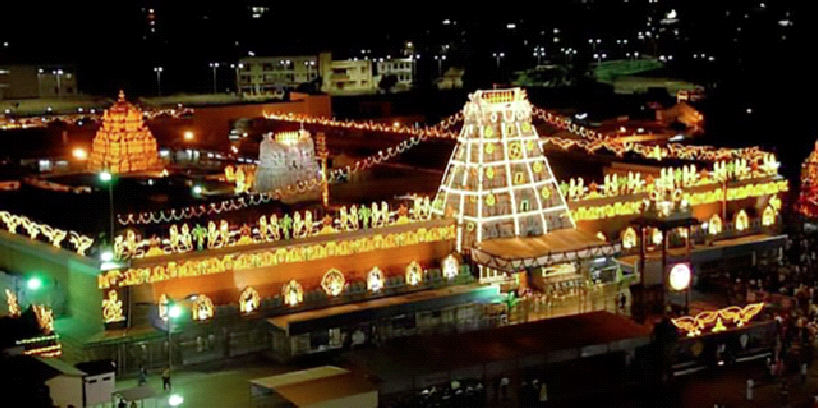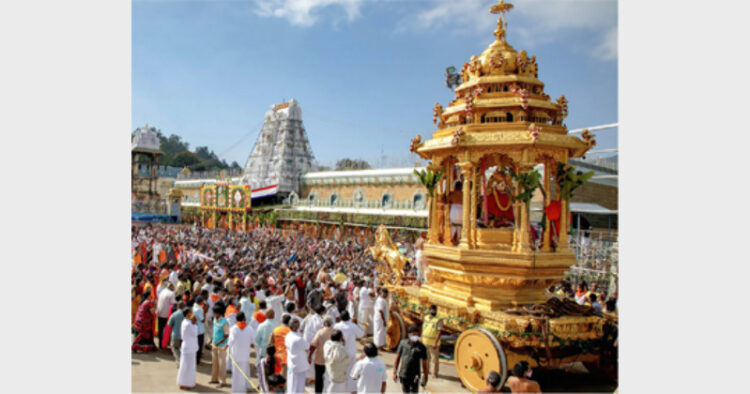Controversies have become a new routine for the Board of the Tirumala temple. The TTD Board remained in the headlines in the last few years for several mismanagements, the latest one that emerged is contentious constitution of a ‘jumbo board’ with 52 special invitees besides the regular board members as per the Act. The special invitees may not have voting rights in board as per the government orders, but they do have privileges on par with TTD trust board members including the recommendation to the darshan.This is an extension of the political game of rehabilitating their party leaders followed by successive Governments in the State. The Government of YS Jaganmohan Reddy went a step more in accommodating businessmen with questionable credentials, corrupt persons, criminals, and tainted individuals. The special invitees include co-accused of Jagan in the quid pro quo disproportionate assets case and a mining baron who became infamous in the context of demonetisation. That person was nominated to the Board by the previous regime but was removed from that position in 2016 following income tax raids on him. The present Government accommodated him.The Government headed by Jagan has altered the norms for the appointment of some members. YV Subba Reddy, the uncle of CM Jagan, and also the political in-charge of the East Godavari District was rewarded a second term as Chairman of the Board.
Agenda no more hidden
Board constitution is the tip of the iceberg of pro-Christian agenda now being implemented by Jaganmohan Reddy Government. The evangelists are having a field day. While there are overt and covert restrictions on Hindu congregations in the context of epidemic, no such restrictions were ever imposed on the congregations of other religions and political gatherings of the ruling party. Cross symbols frequently appeared mysteriously on the Tirumala Hills in the recent past. Every time Hindus have to run a social media campaign to bring the government to its senses and rectify the misadventures.
Previously, there were reports of proselytisation attempts on the seven hills and recruitment of non-Hindus as employees. Many of the employees of Christian faith are appointed in the TTD and they are paid from the Hindu endowment funds. These employees though exposed on video no action was forthcoming from Jagan’s Government. This inaction on the part of the government has encouraged those Christian staff to convert their TTD quarters as centers of religious campaigns and conversion activity. The land on which Islamic University has come up belongs to TTD. Despite production of documentary evidence for that no action from the government is forthcoming to get that Islamic Centre out of that land.
Last year, Jagan Government tried to secretly use Lord Balaji’s wealth to a tune of Rs 12, 000 crore to fulfil its political promises. A massive backlash from Hindus against the Board’s decision forced the TTD to rescind its intention. The main complaint against this Government is its way of looking at TTD not as religious and spiritual center but as a revenue-generating organisation only. To make money the previous Board resolved in 2020 to dispose of its ‘unmanageable’ 23 properties.
Despite the protests from Hindu organisations the TTD Board is still treating Tirumala as a shrine on which they can make money. The very words of “loss of income during Corona in 2020” by the TTD authorities itself confirms non-spiritual attitude of the present Board. To garner money the TTD board stopped the ‘free darshan’ for people until recently while the rich were allowed to have darshan of the deity. It is very poor but highly devoted men and women who wait in the quees for over 7 to 10 hours to have glimpses of Balaji for a few seconds.The pay and pray practice undermine the faith of ordinary people. Even the rich are also forced to purchase the tickets at exorbitant rate.
Devotees have no voice
The temple administration and conducting the religious rituals was initially in the hands of the religious heads, mahants and people with spiritual bent of life. Now it is the sole responsibility of the TTD which is running at the whims and fancies of the CMs of AP through the Executive Officers appointed by them and members of the TTD Board. There are complaints about the proper conduct of rituals at the temple.The Supreme Court on September 29, asked the TTD to respond to allegations of irregularities in the conduct of ‘sevas’ and rituals at the Tirupati Temple.
Jagan’s father YS Rajasekhar Reddy as CM has tried to restrict the Lord of Seven Hills to three hills as he has other plans in grabbing those four hills. Then he was forced to take back that grabbing attempt but this time around his son is focusing on hitting both at the religious sanctity of Tirumala shrine and take away the money given by the devotees for the specific purpose of protecting Hinduism and spreading the Hindu dharmic way. Not even rupee is going tospread Hindu Dharma. The hereditary trustees, Mahants, Archakas, other temple-oriented communities, as well as the worshippers who account for the major source of offerings and funds of the religious institutions “have become passive observers and distant onlookers with practically no say in religious matters”.
Jagan’s father YS Rajasekhar Reddy as CM has tried to restrict the Lord of Seven Hills to three hills as he has other plans in grabbing those four hills. Then he was forced to take back that grabbing attempt. but his son is focusing on hitting both at the religious sanctity of Tirumala shrine and take away money given by devotees for the specific purpose of protecting Hindutva and spreading the Hindu dharmic way
In his political campaign, Jagan made several allegations against Chandrababu Government about misuse of TTD and its wealth. The serious allegations prompted Dr Subramanian Swamy to file a writ petition in the Supreme Court in Sepember 2018 to free 11 temples under TTD from the control of the Andhra Pradesh Government and to challenge the constitutional validity of the various provisions of the Andhra Pradesh Charitable and Hindu Religious Institutions and Endowments Act, 1987. It was stated in the petition thatthe Andhra Pradesh Government “has virtually usurped the fundamental religious, administrative and cultural rights of Hindu citizens and denominations,” whichconstitutes an egregious infringement of their rights and their freedom to profess, practice and propagate their religion. As the Supreme Court asked to move the High Court of Andhra Pradesh, the petition is now pending before the Andhra Pradesh High Court.

The Jagan Government tried to secretly use Balaji’s wealth to a tune of Rs 12, 000 crore to fulfil its political promises. A massive backlash from Hindus against the Board’s decision forced the TTD to rescind its intention. The main complaint against this Government is its way of looking at TTD not as religious and spiritual center but as a revenue-generating organisation only
In the same petition, an interim injunction for an external audit of the TTD accounts, utilisation of funds and properties for three financial years beginning 2014-2015 and an inventory of jewellery have been sought in the wake of a controversy over the alleged missing of valuable jewellery of Prabhu Venkateswara. Even before getting a court direction to that effect, the TTD Board suddenly announced in September 2020 that the financial accounts of the country’s richest temple would be audited by the Comptroller & Auditor General of India instead of the state Audit Department. The decision of the Board came as a pleasant surprise, though the motive behind such a major decision is not above suspicion. However, progress made in that direction is yet to be known.
Continuing colonial legacy over Hindu temples
Controlling Hindu temples is a colonial legacy. In 1817, the first Madras Regulation was passed, and the East India Company took over the temples. They plundered the enormous wealth of the temples and took away valuable gold, silver, diamonds, and jewellery. After looting them for over three decades, they were restored to trustees. The Christian Missionaries were also opposed to the idea of managing Hindu pagan temples by the Christian East India Company. By 1925, temples had emerged as centres of the freedom movement and consequently, the Madras Religious and Charitable Endowments Act was brought in to bring them again under Government control. Since the minority communities strongly protested, their places of worship were spared, and only Hindu temples were taken over. After Independence, the Tamil Nadu Religious and Charitable Endowment Act was passed. It was a pioneering legislation based on the colonial viewpoint. The Endowment laws of other states are based on this, and thus the colonial legacy is continuing.














Comments